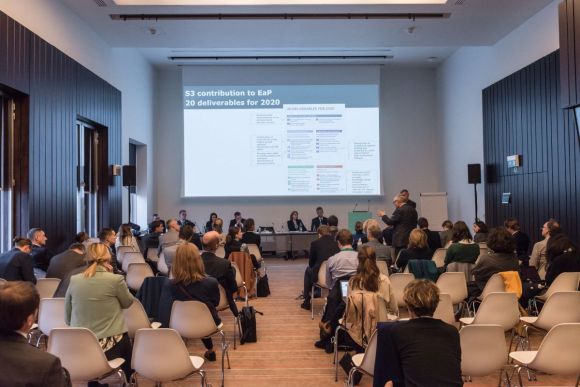
From year to year, the local governments are putting more effort to implement the regional development strategies in Ukraine, Moldova and Georgia. Indeed, such actions are more than justified, the regional policy is one of the essential points of the Association Agreements with these countries.
In the boundaries of EU Regions week, the high-level representatives meet together to compare their experience in transition from a centralized planning system, and to discuss their progress on Smart Specialisation with Joint Research Centre.
Ukraine: in the center of our politics are people
“The main goal of Ukraine’s regional policy is a high standard of living and a safe environment for all citizens regardless their place of residence”, emphasizes Dmytro Zhyvytskyy, First Deputy Minister of the Ministry for Communities and Territories Development of Ukraine. Despite the annexation of Crimea and military actions in Donbas, Ukraine continue to enact the decentralization reform. In fact, one of the most successful covers - it 29% of Ukraine’s population and 41% of Ukraine’s area. Thanks to the reform, 951 amalgamated territorial municipalities have been established since 2014. Furthermore, concentrating on the education, healthcare and social protection, Ukraine spent more than 19 bln UAH of regional development funding on 5281 projects in 2018. This year budget has been increased to 35.45 bln UAH. Talking about the future, Ukraine has already settled many promising goals:
-
complete the decentralization reform;
-
provide new territorial basis for regional development and a new service delivery system;
-
continue the implementation of Smart specialization;
-
applicate the geoinformation technologies in regional development management;
-
develop the capacity across all levels of government
Georgia: human capital, urban renewal and local development
Georgia’s Regional development programme is based on the EU Cohesion Policy experience of recent decades and aims to reduce the disparities between regions. The overall indicative budget for regional development (PIRDP) is estimated at 67.23 mln euro (53.75 mln euro from the EU budget) to be spent between 2020-2022. Mzia Giorgobiani, Deputy Minister of Ministry of Regional Development and Infrastructure of Georgia, explains that the main priorities for Georgia for the next period are urban renewal, improvement of competitiveness and integration of local development.
As Ukraine, Georgia have been working on the decentralization strategy. The key strategic objectives for 2019-2025 are:
- increasing role of local self-governments in resolving significant part of public issues;
- providing local self-government with appropriate material and financial resources;
- establishing transparent local self-government.
Moldova: big achievements and larger goals
The aim of National Strategy of Regional Development of Moldova is balanced and sustainable development ensured in all regions. During third phase of regional policy implementation (2016-2020), Moldova completed 24 infrastructure projects. Igor Malai, the Head of the Directorate for Regional Development at the Ministry of Agriculture, Regional development and Environment of Moldova underlines the main achievements of this period:
-
ensuring access to public services and utilities (increasing rate of connection of population to water public services and rate of improved regional roads);
-
ensuring sustainable economic growth – out of 26 cities in Moldova there are 6 growth poles;
-
Improved governance in regional development
Although it is a good result, Moldova plans to implement 86 more infrastructure projects until the end of 2020. In the future, the country is going to focus on a new law on regional development, a synergy of national and international funding and urban development.
Smart specialization: the way to boost the potential of the regions
Smart specialization is an innovative concept, which helps regions to grow and reveal their capacity. All three countries have been working with Joint Research Centre (EU) on elaborating the strategy. Ukraine and Moldova have actively undertaken the mapping exercises in pilot regions, while Georgia is preparing for future actions. Alessandro Rainoldi, the Head of Unit European Commission, JRC, presents the plan for future cooperation. In 2019-2020, the focus will be on the regional teams and experts training in Ukraine, awareness-raising at regional level in Georgia and mapping exercises and workshops in all three countries.
Olha Cherenkova (Ukraine)



